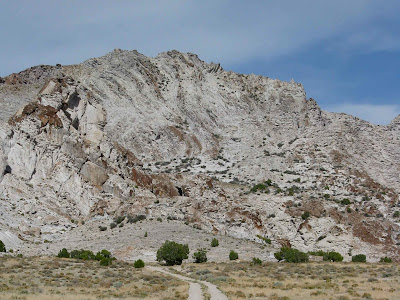 |
Where is this? Second turning to the right, and straight on till morning.
|
This month’s Accretionary Wedge (#46) is hosted by Cat at Knowledge Flocs. The topic is the interplay between geology and civilization. Given that I live in Wyoming, the obvious thing to write about is resource extraction since oil, gas, coal, bentonite etc. are the reasons, direct or indirect, that most of us here are able to make a living. Revenue from resource extraction really is the basis of our economy. But it doesn't interest me. Instead, I’m writing about the role of geology in vacations.
 |
... jump on the wind's back, and then away we go!
|
Vacation is a major benefit of modern civilization, as we no longer have to work most of our waking hours. I would argue that it is a necessity as well. Many of us require relatively little time to secure adequate food and shelter; rarely do we have to defend ourselves to survive. Even so, we come up with enough other “needs” to keep us plenty stressed -- satisfying possessions, a comfortable home, the latest styles, achievement for ourselves and our offspring, and self-approval in general. A real vacation, one that removes us for a time from the demanding lives we make for ourselves, is a wonderful thing.
How does geology fit in? Geobloggers probably already know, but generally when I explain to friends that I’m planning, leaving for, or returning from a geology vacation, they look puzzled and politely mumble something to the effect of “how interesting.” Little do they know!
First, for those who love the outdoors, geology greatly enhances that passion. As AW hostess Cat says: “Understanding the geology of an area only adds to its beauty and can make any adventure more interesting.” For example --
The scenery along Onion Creek north of Moab, Utah, is spectacular all by itself, but how much more exciting it is with the realization that one is driving through the cap of a collapsed salt dome! Salt that accumulated in shallow ocean basins 300 million years ago was buried under enough sediment to turn it into plastic goo that flowed and pooled underground, uplifting the dome. Then ground water reached the salt, dissolved it, and the dome collapsed. Now the Onion Creek Road passes through bizarre contorted beds of gypsum, shale and limestone, relics of Paleozoic seas.
Geo-tripping also is a path to healthy detachment, putting life in perspective in space and time. My little issues pale compared with the scale of looming volcanic destruction on the east side of the Sierra Nevada (California; evidence below). Forget those silly cares, besides, it's such a gorgeous day!
 |
He had no sense of time, and was so full of adventures ...
|
“... about fifteen miles below the embers in the fire are rocks made soft under the influence of heat and pressure. These pliant rocks are alive with motion. To be sure, the motion is slow, perhaps a few millimeters per year, but it is motion nonetheless.”
 |
| Nice sign, but mileages will have to be changed in 10 million years or so. |
The coast of California is even more mind-boggling, and wonderfully so -- diving crustal plates, sliding crustal plates, ocean crust shoved over continental crust, deep mantle material oozing up to the surface ... wow! The Earth is so dynamic. How cool to be able to appreciate this, even though I'm too short-lived to see much change myself.
Left: pondering the contorted geologic mess of the Central California Coast, a worthy pastime.
But detachment doesn't come quickly. It always takes a week or two for my other world to dim and fade from view. Then once it does, it becomes very difficult to return to it.
 |
I don't want to be a man ... I want always to be a little boy and have fun.
ever-farther away from the Real World.
|
I found this surreal landscape in the middle of nowhere at the end of a rough two-track. Others had been there before me; there was a well-constructed fire ring and a stash of juniper wood. After putting up my shelter and cooking my food, I rounded up a bit more juniper, built a small fire, and nursed it through the evening to keep away the chill -- as people have done for many thousands of years. So which is the real world?
“I feel protected and secure here, far removed from the din and demands of a life that bounds uncontrollably, like some wild mustang, across the alien landscape of the modern world.”
 |
Photo by Ronn Koeppel.
|
“that extraordinary feeling of being ferociously in love with the world can provide the kind of fulfillment we all seek ... the things we felt in the wilderness are still there deep inside each of us, and can be retrieved on demand, if we only remember to do so."
Sources (of quotes)
Barrie, James M. 1911. Peter and Wendy (Peter Pan).
DeCourten, Frank L. 2003. The Broken Land -- adventures in Great Basin geology. Salt Lake City: University of Utah Press.





No comments:
Post a Comment